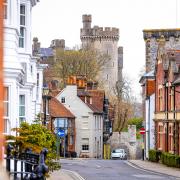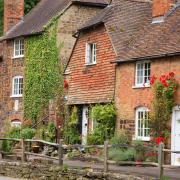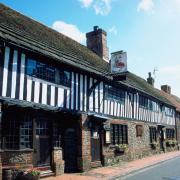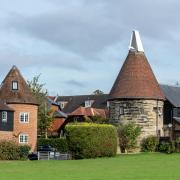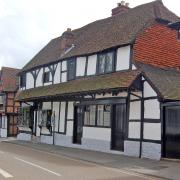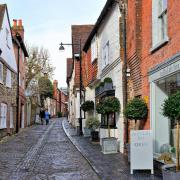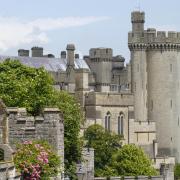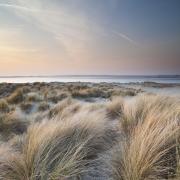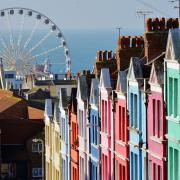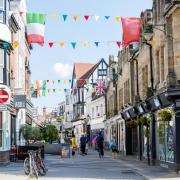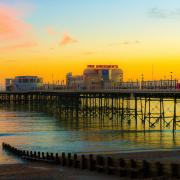Sussex is home to the UK’s largest re-wilding project. Hazel Sillver visited the Knepp Estate to witness some groundbreaking ecology and enjoy a Wildland Safari

Pootling along the A24 just south of Horsham, you may not realise that hidden behind the trees and hedges is one of the country’s most inspiring ecology projects. The 3,500 acres of the Knepp Estate are almost 15 years into a re-wilding experiment: this once intensively farmed land is being allowed to do its own thing.
A beautiful tapestry of scrub and wetland is gradually reforming, with minimal human intervention, and as it does so more and more wildlife are lured here. Herons stand watch in the wetlands, nightingales sing in the mesh of thorn and bramble scrub, rare bats skim the water of the ponds and butterflies flock in colourful clouds to breed.
I was lucky enough to visit the wildlands of Knepp, attending one of the Wildland Safaris the estate is now offering, on a clear evening in spring.
“My ancestors farmed this land, as I did for 20 years, but it was always a struggle,” recalls Charlie Burrell, who owns and runs Knepp Castle along with his wife, the acclaimed travel writer Isabella Tree. “We were farming intensively, but we weren’t making much money,” he says, as he drives his safari wagon through lush green scrub, sending a herd of fallow deer careering away. The other safari -goers and I hang on, as the vehicle meanders through a scrub of wild dog roses and sallow that is alive with birdsong.
After visiting the Oostvaardersplassen project in the Netherlands during the 1990s, Burrell made the decision to give up intensive agriculture. “At this fantastic 15,000 acre project in Holland, land has been reclaimed from the sea and turned into a thriving landscape – the system is a new way, or, rather, a natural way, of approaching land management, farming and ecology, and it’s centred around grazing animals.”

Oostvaardersplassen is predominantly the work of an ecologist called Frans Vera who brought in grazing animals, such as Heck cattle, Konik horses and Red deer, to recreate a Paleolithic ecosystem; Vera’s thesis being that these animals create a successive cycle of natural landscape through grazing: from grassland to scrub to wood pasture to groves and back again to grassland.
“We decided to do the same here in Sussex,” says Burrell, who in 2001 stopped dairy farming, pulled up 250 miles of fencing and introduced grazing animals. “We have longhorn cattle, deer, Exmoor ponies and Tamworth pigs, which imitate the mix of herbivores that would have grazed this land thousands of years ago.”
I join the safari party high up on a tree platform and gaze out over the resulting wildland below. Yes, this is definitely England – the scent of bluebells hangs in the air, oak leaves rustle around us and below the wildlife is familiar – there are herons, deer and cattle. Yet there is something alien about this scrub and wetland terrain – in a way it is reminiscent of Africa, where large grazing animals form the landscape. In fact this is what Europe would have looked like after the last ice age and it is beautiful.
As well as looking good, the Knepp re-wilding project is hugely important in terms of conservation. “Since we allowed the land to regenerate itself, all sorts of wildlife have made this their home or their breeding ground,” says Burrell. Knepp now has two per cent of the UK breeding population of nightingales, as well as rare birds (such as turtle doves and ravens), bats and the UK’s second largest population of Purple Emperor butterflies.

“Re-wilding is not about conserving what little we have,” explains Charlie, “rather it’s about recreating the conditions that allow natural processes to return. At Knepp, we have moved from intensive farming to extensive farming, with pasture-fed livestock.” This is organic farming, but not as we know it – the herds here can roam at will amidst a biodiverse landscape.
After a delicious supper in a beautifully converted barn, the safari-goers head out into the cool night to delight in one of the joys of spring. High up on a moonlit platform in the oak canopy, we stand silent and listen to the song of the nightingale.
These enchanting singers are, explains Knepp’s resident ecologist Penny Green, male birds calling out to females flying in from Africa. Each male hopes that, lured by his beautiful melody, one will flutter down and nest with him.
The evening nightingale safaris are just one highlight on offer at Knepp. This month there is the chance to see clouds of male Purple Emperor butterflies perform one of the most extraordinary mating rituals in the insect kingdom.
Visit for a safari day or just half a day, but for the full experience treat yourself to a stay in one of the yurts, bell tents or shepherd huts; or pitch your own tent beneath the summer stars amidst the Knepp wildflower meadow. Who needs to go to Africa when you can safari in Sussex?

For further information call 01403 713230 or go to kneppsafaris.co.uk ***READ ON• The Christie family at Glyndebourne: making an opera house a home - The Christie family have made an internationally renowned success of their Glyndebourne grounds. But how have Gus Christie and his wife, soprano Danielle de Niese, made an opera house a home?
• Best places for a picnic in Sussex - Spread out the rug and feast on cucumber sandwiches at one of these top picnic spots around Sussex.






